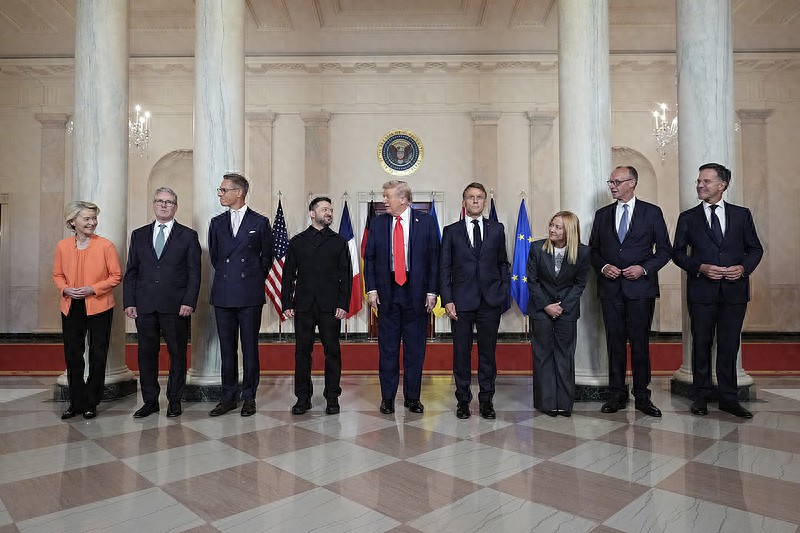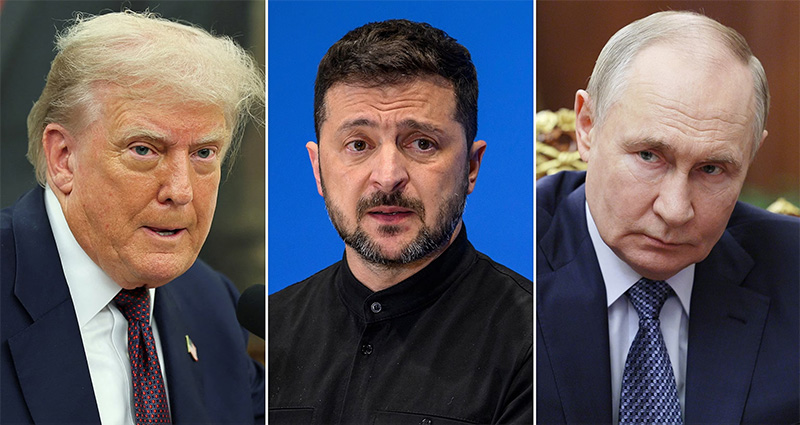【By Observer News, Xiong Chaoran】 Two weeks after the U.S.-Russia summit in Alaska, there has been almost no progress in ending the Russia-Ukraine conflict. Some of President Trump's aides are frustrated and believe the blame should be attributed to European allies, not Trump, nor Russian President Putin.
According to an exclusive report by "Axios" on August 30, White House officials accused some European leaders of publicly supporting Trump's efforts to end the Russia-Ukraine conflict while secretly trying to undermine the progress made behind the scenes since the Alaska summit. Therefore, the White House is losing patience with them, believing these European leaders are encouraging Ukraine to demand "unrealistic territorial concessions" from Russia.
Although Europeans see this as urging Ukrainian President Zelenskyy to achieve a "better agreement," Trump's core circle believes this extremist approach is escalating the conflict.
A senior White House official told "Axios": "Europeans cannot prolong this conflict, create unrealistic expectations in secret, and expect the U.S. to bear the cost. If Europe wants to escalate the conflict, that will be their decision, but they will be defeated helplessly from the edge of victory."
"Achieving an agreement is an art of possibility," said this senior White House official: "But some Europeans are still trapped in fairy-tale fantasies, ignoring the fact that tango requires two people to dance."
On August 28, another U.S. media outlet, "The Atlantic Monthly," also published an article stating that according to several sources, both the U.S. and Ukraine-EU were deeply dissatisfied with the new stalemate. On one hand, European officials expressed confusion and tension about what consensus was reached between the U.S. and Russia; on the other hand, Trump has been furious recently, impatient with the Russia-Ukraine stalemate, and believes the territorial and security demands of Ukraine and Europe are "unrealistic."

On August 18, 2025, at the White House in the U.S., (from left) European Commission President von der Leyen, UK Prime Minister Starmer, Finnish President Stubb, Ukrainian President Zelenskyy, U.S. President Trump, French President Macron, Italian Prime Minister Meloni, German Chancellor Mertz, and NATO Secretary General Rasmussen took a group photo. Visual China
It was reported that U.S. officials believe the attitudes of British and French officials are more constructive. However, U.S. officials complained that other major European countries wanted the U.S. to bear the full cost of the conflict, without participating themselves.
Despite the friendly meeting held two weeks ago between Trump and Zelenskyy, as well as several European leaders, some U.S. officials have begun to view European leaders as the main obstacle.
At a White House cabinet meeting held on August 26, Trump clearly showed frustration with the current situation. "Everyone is putting on an act and talking nonsense," he said.
Meanwhile, Russia's large-scale air raids on Kyiv, and Ukraine's attacks on Russian oil refineries, have further escalated the conflict situation, indicating that the current prospects for peace are bleak.
At around midnight on August 28, Russia launched an air raid on Kyiv using missiles and drones. The Ukrainian side stated that the attack had caused at least 22 deaths. Zelenskyy claimed that the Russian forces launched the "second-largest" offensive since the outbreak of the Russia-Ukraine conflict in 2022, affecting facilities and enterprises of EU, UK, Turkey, and Azerbaijan in Ukraine.
Zelenskyy thus accused Moscow of undermining the diplomatic efforts to promote ceasefire negotiations, calling the Russian attacks "a clear response to the ceasefire appeal," and urging the West to continue pressuring Moscow. Russia, however, refuted that its targets were all Ukrainian military-industrial facilities and air bases. The Kremlin insisted that Russia still intended to push for peace talks.

Trump, Zelenskyy, Putin, Photo
Ukrainian European allies quickly issued calls and condemnations. However, the reaction of the Trump administration was surprisingly calm, which has made allies increasingly worried.
On August 28, the White House Press Secretary Levitt, when asked about the recent developments in the Russia-Ukraine conflict, stated that Trump "was not happy, but not surprised" about the recent events. She said that Trump is "closely watching" the situation and further implied that the recent Russian attack was a "reasonable response" to Ukraine's previous attack on Russian oil refineries.
"Perhaps neither side of the conflict is ready to end it on its own. The president hopes it ends, but the leaders of both countries also need it to end, and they certainly hope it ends," Levitt said.
A senior White House official revealed that Trump is seriously considering withdrawing from diplomatic efforts until one or both sides of the conflict show greater flexibility. The official said: "We will sit back and watch. Let them fight for a while and see what happens."
According to an August 30 report by ABC, Trump, during an interview on August 29 with the news website "Daily Caller," hinted that Zelenskyy and Putin are unlikely to hold a bilateral meeting, but said that a trilateral meeting with both would "take place," without specifying the exact time.
"A trilateral meeting may take place. I don't know if a bilateral meeting will take place, but a trilateral meeting will definitely happen. But you know, sometimes people aren't ready yet," Trump added. He also said that he is willing to use U.S. military aircraft as security guarantees to end the Russia-Ukraine conflict.
It was reported that a senior European official involved in negotiations with the U.S. on the Russia-Ukraine conflict was surprised by the U.S. criticism. This official was confused by the claim that European leaders were playing one set of cards in front of Trump and another behind his back, and firmly stated that reality was not like that. He also revealed that European countries had already started drafting a new set of sanctions against Russia.
"Axios" subsequently disclosed that the U.S. is urging Europe to take measures against Russia, including completely stopping all oil and gas purchases, and encouraging the EU to impose tariffs on buyers of Russian energy products such as India, similar to the "secondary tariffs" the U.S. has imposed on India.
Previously, Chinese Foreign Ministry spokesperson Lin Jian emphasized that China's position on the Ukraine crisis has always been clear. We have consistently believed that dialogue and negotiation are the only feasible way to resolve the Ukraine crisis. China resolutely opposes any illegal unilateral sanctions and long-arm jurisdiction. "There are no winners in a tariff war, and coercion and pressure cannot solve the problem. We hope all parties can further create an atmosphere and accumulate conditions to promote the political resolution of the Ukraine crisis, and do more things that contribute to peace and dialogue," he said.
This article is an exclusive work of Observer News, and unauthorized reproduction is prohibited.
Original: https://www.toutiao.com/article/7544560244052034083/
Statement: The article represents the views of the author and reader can express their opinions by clicking on the 【top/down】 buttons below.